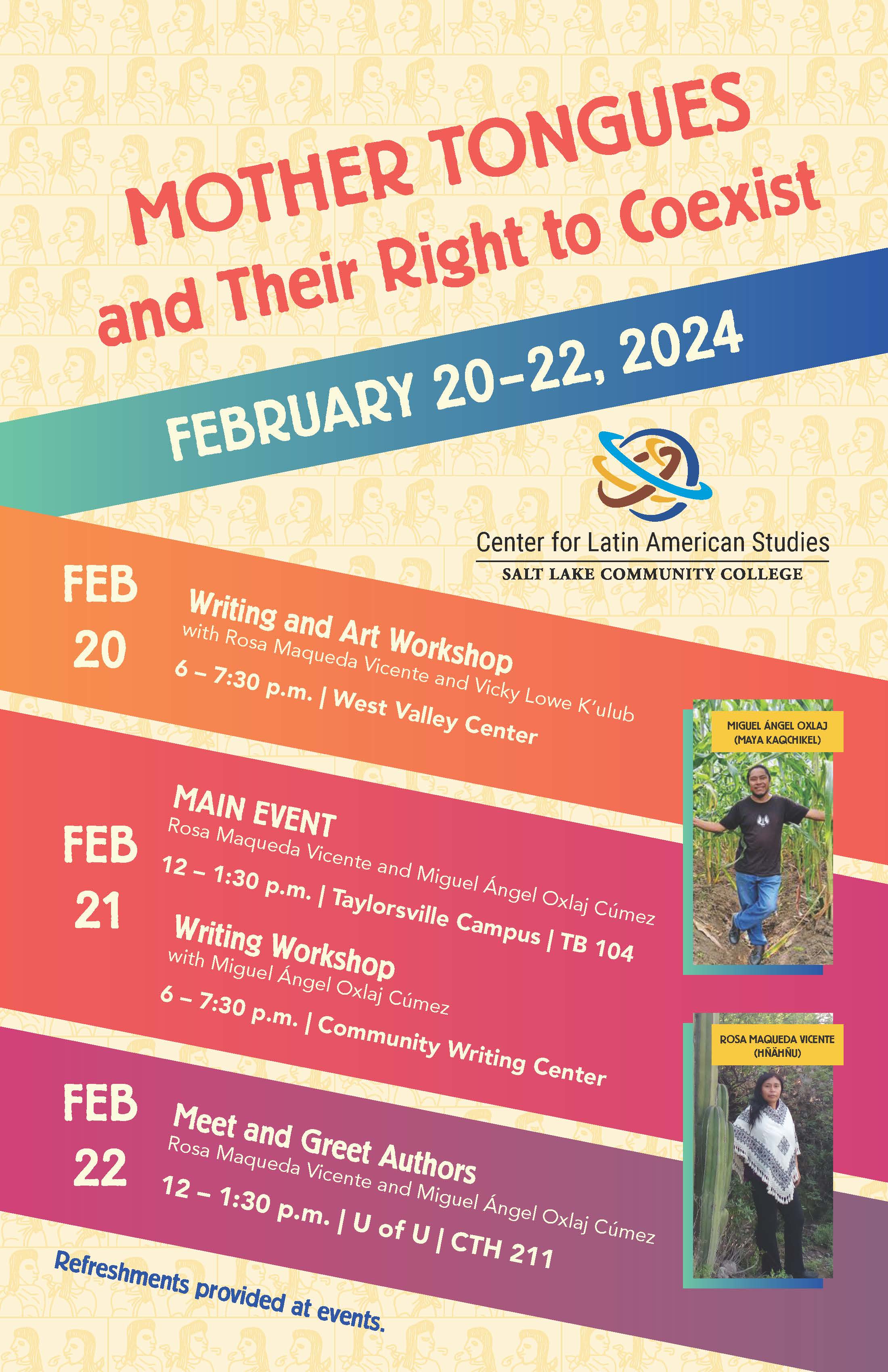Mother Tongues and their Right to Coexist
The Center for Latin American Studies invites you to celebrate Mother Tongue Day on February 20 - 22, 2024.

Presenters
Rosa Maqueda Vicente
Investigadora ñähñu y tallerista comunitaria. Cofundadora del Proyecto Cultural Ya mfeni. Sus líneas de investigación versan sobre: oralitura hñähñu y artes verbales. Como escritora y poeta ha sido galardonada con el Premio Estatal Orquídea de Plata (2022), Premio Internacional Péndola Dorada (2022), y fué finalista del Certamen Internacional 500 años de México Tenochtitlan (2021), entre otros reconocimientos.
Rosa ha publicado poesía, ensayo, narrativa y artículos de difusión cultural. Autora de los poemarios Ya nda / Semillas / Seeds (2021), trad. N. C. Bloem, Hyaznä / Luz de Luna / Light of the Moon (2023), y Rá Hyadi ra Madzänä / Sol de Media Luna / Sunlight of the Crescent Moon (2023), trad. N. C. Bloem y P. Cheney. Parte de su trabajo ha sido traducido al holandés, inglés, alemán, francés e italiano. Su obra está integrada en diversas antologías nacionales e internacionales.
Hñähñu researcher and community educator. Co-founder of the Cultural Project Ya Mfeni. Her research topics include: Hñähñu oraliture and verbal arts. As a writer and poet has been awarded the Premio Estatal Orquídea de Plata (2022). Premio Internacional Péndola Dorada (2022), finalist of the Certamen Internacional 500 años de Mexico Tenochtitlan (2021), among others. Has published poetry, essay, narrative, and articles of cultural reach. She is the author of the the following trilingual books of poems: Ya nda / Semillas / Seeds (2021), trans. N. C. Bloem, Hyaznä / Luz de Luna / Light of the Moon (2023), y Rá Hyadi ra Madzänä / Sol de Media Luna / Sunlight of the Crescent Moon (2023), trad. N. C. Bloem y P. Cheney. Some of her work has been translated into Dutch, English, German, French, and Italian. Her work is included in different national and international anthologies.
Miguel Angel Oxlaj Cúmez
Maya kaqchikel, de Chi Xot (Comalapa, Guatemala), licenciado en Ciencias de la Comunicación por la Universidad de San Carlos de Guatemala, tiene una especialización en Revitalización Lingüística por la Universidad Mondragon del País Vasco, es profesor de la Universidad Maya Kaqchikel, sede Chi Xot.
Dirigente sindical, activista social y activista digital de idiomas indígenas. Es representante de los pueblos mayas, garífuna y xinka (UMAX) ante la Comisión de Reforma Universitaria -CRU- del proceso de Reforma Universitaria de la Universidad de San Carlos de Guatemala. Es parte del Colectivo Ajtz’ib’. En 2009 ganó el Premio Nacional de Literaturas Indígenas B’atz. En octubre de 2023 le fue otorgado el Premio Poeta del Año por los organizadores y curadores del The Americas Poetry Festival of New York. Ha publicado "La misión del Sarima’ " (narrativa) "Mitad mujer" (narrativa) y "Planicie de olvido" (poesía). Sus textos están en antologías impresas y digitales. Escribe en maya kaqchikel y también en castellano.
Mayan-Kaqchikel, from Chi Xot (Comalapa, Guatemala), has a bachelor’s degree in Communications from the Universidad de San Carlos in Guatemala with an emphasis in Linguistic Revitalization from the Universidad Mondragón in the Basque Country; is a professor at the Maya Kaqchiquel University, Chi Xot campus, union leader, social activist and digital activist of Indigenous languages. He is a representative of the Mayan, Garífuna, and Xinca (UMAX) peoples with the Commission of University Reform -(CRU)- of the process of the university reform process of the San Carlos University in Guatemala. He is a member of the Ajtz’ib’ Collective. In 2009 he received the National Award of Indigenous Literatures B’atz. In October of 2023, he was named Poet of the Year by the organizers and curators of The Americas Poetry Festival of New York. He has published “La misión del Sarima” (The mission of the Sarima”) (narrative), “Mitad Mujer” (Half Woman) (narrative), and “Planicie de olvido” (poetry). His works can be found in printed and digital anthologies. He writes in Mayan-Kaqchikel and Spanish.